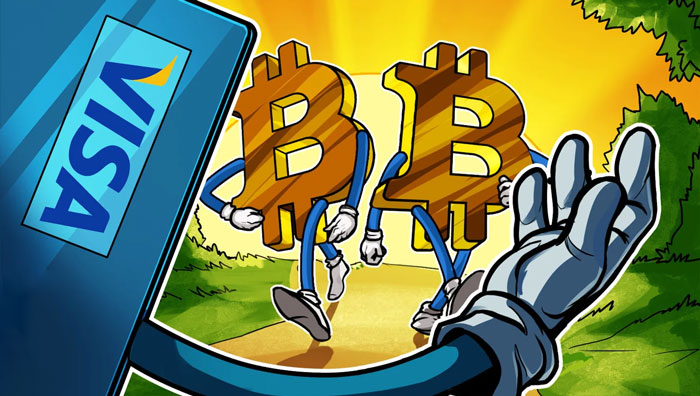
In the past few months, payment giants Visa, Mastercard and PayPal have radically changed their attitude towardscryptocurrencies and blockchain technology, announcing the intention to integrate crypto payments into their platforms.
We are talking about the process of global adoption of crypto-innovations in the world of traditional finance. How exactly do payment giants enter the crypto market — Let's look at today's material.
Visa experience
On March 16, 2018, Visa CFO Vasant Prabhu criticized cryptocurrencies, including Bitcoin, emphasizing that these assets are a bubble. Bitcoin then cost $8,300.
July 22 of this year, when the first cryptocurrencyrose to $9,360, a post appeared on the official Visa blog with a very different message entitled “Evolving Our Approach to Digital Currency.” In the post, the company said its partnership with two regulated crypto platforms, Coinbase and Fold, is part of a corporate strategy to integrate digital currencies into its payments system, which covers 61 million retailers. In its announcement, the company highlighted the importance of stablecoins, which have “stepped beyond the fintech space” and are now included in the ecosystem of a number of financial institutions and central banks.
From a message from the payment giant it became known thatthat “more than 25 digital wallets have linked their services to Visa.” Visa also noted that these 25 crypto service providers will be able to use the full range of capabilities of the payment giant, including the Visa Direct option and the FastTrack platform. It is worth noting that the corporation also financially supported the company Anchorage, which studies the cybersecurity of cryptocurrency ecosystems. Visa says the company's main goal is to "continue to do what we do best: evolve our system to support new forms of commerce."
On July 28, at a meeting with investors, in whichVasant Prabhu took part and discussed in detail that Visa sees great potential for its own development in the growing popularity of e-commerce and digital payments. There was also talk about the corporate payments system Visa B2B Connect, which is designed to facilitate cross-border financial transfers without the aid of the typically slow correspondent banking network.
Mastercard experience
A similar evolution is taking place before our eyes with Visa's competitor - the Mastercard payment system.
So, on July 26, 2018, the general directorMastercard Ajay Banga compared cryptocurrencies to things that are thrown in the trash. However, two years later, the payments corporation has largely changed its approach to cryptocurrencies. On July 20, it became known that Mastercard had signed an agreement with the cryptocurrency company Wirex. This financial startup allows you to buy and sell cryptocurrencies with fiat money. Since last month, Wirex has become a member of the Mastercard ecosystem with the right to independently issue cards from this payment giant. Let us recall that earlier, in February of this year, a similar decision was made by Visa Corporation regarding the Coinbase crypto exchange.
Moreover, Mastercard intends to launcha special program to support other crypto companies. As Mastercard’s Executive Vice President of Digital Assets, Blockchain Products and Partnerships, Raj Damodaran, explained, “The crypto market continues to evolve, and the corporation is helping to advance it by providing reliable and secure services for individuals and companies in the modern digital economy.”
PayPal experience
Another payment giant, PayPal, has long beenhas not advertised any intention to integrate cryptocurrencies into its structure. However, on July 14, the media published a letter from the corporation to officials of the European Commission, where PayPal admitted that it is actively developing applications using cryptocurrencies.
Number of PayPal users worldwideexceeds 300 million people, and the company operates in Europe thanks to a license for banking and payment services obtained in Luxembourg. In total, the PayPal payment service is represented in 31 European countries, where the company serves 95 million merchants and retail consumers. It is worth noting that PayPal, along with Visa and Mastercard, was previously part of the Swiss Libra Association, which is implementing Facebook’s crypto project to launch the Libra stablecoin.
PayPal is developing a roadmapto integrate their own payment crypto services, is also clearly evidenced by the announcement of the recruitment of members of the blockchain technology research team, which requires a senior researcher-engineer. This specialist will be responsible for "development, creation and maintenance of key crypto products / services, which will be focused on increasing the efficiency and scale of services provided by PayPal." Information about the open vacancy appeared at the end of June.
PayPal does not deny its interest incryptosphere, but have not yet confirmed information about the development of certain crypto applications or services, for example, based on the Venmo mobile application, affiliated with the payment giant.
Who will be the leader in this race?
Nevertheless, crypto market players themselves are actively looking forways to integrate with PayPal. This is evidenced by blockchain company Pundi X, which integrated PayPal support for its Xpos merchant device on July 1st.
Another player in the crypto industry, a fintech companyRipple not only supported the classic payment operator MoneyGram by purchasing 10% of its share capital and investing a total of $50 million, but continues to invest in the integration of cryptocurrencies into this service. At the end of the second quarter, Ripple transferred $15.1 million to MoneyGram.
It is curious that in June innovative successesMoneyGram has become interested in another payment operator, Western Union, which is considering purchasing a competitor. It is worth noting that back in January of this year, experts from Credit Suisse published a report in which they noted Western Union’s interest in blockchain technology and Ripple payment innovations.
Competition for the integration of cryptocurrencies into servicespayment operators is becoming increasingly serious. And one of the main participants in this race was the People’s Bank of China with the digital yuan project. Moreover, in January, even before the worsening of relations between the United States and China, the American PayPal became the first foreign payment operator to officially enter the Chinese market after acquiring the local player GoPay.
The next development step is neobanks
Meanwhile, the integration of cryptocurrencies into financialservices are engaged by a number of fintech startups that could potentially challenge all of the above organizations, including the People's Bank of China with its digital yuan.
Jack Dorsey's Square company was able toin the first quarter of this year, received revenue from transactions with bitcoins in the amount of $306 million. This cryptocurrency service was launched back in 2018, but only in 2020 saw a significant increase in financial indicators. At the same time, since March, through the Square Financial Services division, Jack Dorsey's company has received the opportunity to provide services as a digital bank.
Another fintech giant, Revolut US, backed bySince July 15, the crypto company Paxos began offering a cryptocurrency trading service in all American states, with the exception of Tennessee. Interestingly, traditional financial service providers are also interested in a new partnership with the cryptocurrency “unicorn”. Thus, on June 20, the international company Revolut announced that it would integrate American Express services for its clients.
In the case of Square, Robinhood and Revolutit is not just about trading services, which are provided by various crypto-exchanges. After all, all these companies are de facto neobanks - digital financial organizations that have every opportunity to integrate cryptocurrencies into their services, thanks to various partnerships. And the range of possibilities of such neobanks is much higher than that of traditional payment giants.
That is why in the near future we will becomewitnessing how Visa, Mastercard and PayPal will actively explore the possibilities of buying or investing in a ready-made cryptocurrency infrastructure. These corporations are entering the crypto world, as it is increasingly becoming a matter of their survival in the rapidly changing global financial system.
</p> 5
/
5
(
1
voice
)




